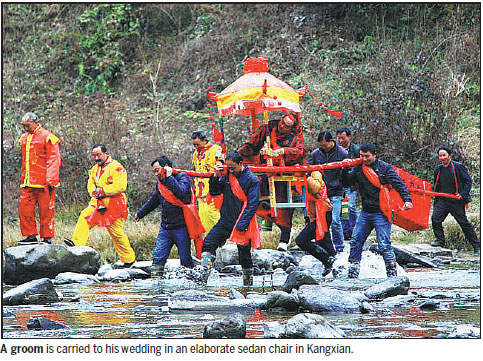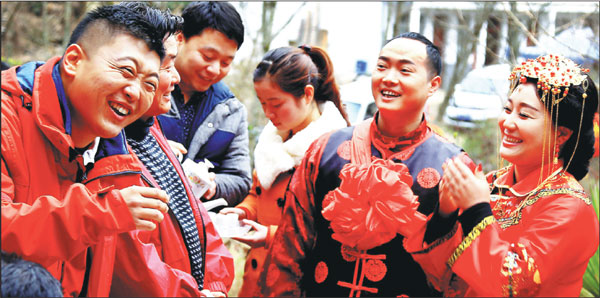Friends and family gather for a post-wedding banquet in Kangxian county, Gansu province. [Photo provided to China Daily]
|
In an isolated pocket of Northwest China, women have traditionally been dominant, with husbands assuming their wife's surname and living with their parents-in-law, as Wang Xiaodong reports from Kangxian county, Gansu province.
In most regions of China, women leave home to get married and then follow their husbands. However, in many parts of Kangxian county in the northwestern province of Gansu, the reverse is true: traditionally, the groom moves in with his parents-in-law and his children take his wife's family name.
"Although this tradition mostly prevails in the southern parts of Kangxian, it also exists in a few other places nearby, such as Lueyang in neighboring Shaanxi province," said Li Wenkang, chairman of the Kangxian Federation of Literary and Art Circles.
Unlike most regions of China, where men traditionally play the main role in the family, women are usually dominant in Kangxian, and they, rather than their husbands, are registered as the head of the family on household registration forms, according to Li, who researches local customs.
Status update
"The tradition has some advantages, such as helping to improve the social status of women. With the development of society and the growing integration of these places with other parts of China, some members of the younger generation are abandoning the tradition, but it is still well preserved in these areas. Last year, I attended two weddings, and at the banquets I heard family members, both male and female, discussing the grooms' new names so they will follow their wife's families."
In 1993, Liang Yan, 47, from Ningqiang county, Shaanxi, married Xu Guilan in Yangba, a township in Kangxian.
Liang, who has three brothers, said his family was poor, so he came to Yangba to work as a brick carrier on construction sites.
"My parents didn't object when I told them I was getting married in Yangba and would live with my wife," he said. "They were actually pleased because they knew I would have a better life there. On my wedding day, I took a bus from Ningqiang to Yangba, accompanied by dozens of my relatives, including my father and my brothers."
After he married, Liang moved in with Xu and her parents. They both looked after the older couple, while Liang also grew tea and repaired houses.
Following a brain hemorrhage in 2009, his mother-in-law could barely move or take care of herself. She died in 2012, but during the last three years of her life, Liang spent a lot of time taking care of her and helping her to move around the township.
Almost every year, he returns to his home village to see his parents, who are in their 80s and live with one of his brothers. However, he always spends Chinese New Year, traditionally the most important festival for family gatherings, at his home in Yangba.
Rebels and recruitment
Of the township's 110 households, more than 20 have husbands from areas outside Gansu, including nearby provinces such as Shaanxi and Sichuan.
"Some of them came here and got married before the founding of the People's Republic of China because they wanted to escape being recruited to the Nationalist army," Liang said.
Li, from the Kangxian Federation of Literary and Art Circles, said the tradition may be linked with the area's isolated location and the defeat of the Taiping Rebellion (1850-64) during the Qing Dynasty (1644-1911), one of the biggest peasant uprisings in Chinese history.
Kangxian, which sits on the border with Sichuan and Shaanxi, is located deep in the mountains. Farming can be laborious work in the prevailing conditions, so an influx of men was necessary to ensure the survival of local families, according to Li.

Some locals believe the tradition has its roots in the defeat of a number of Taiping soldiers in neighboring Sichuan.
To escape being caught and executed by the ruling dynasty, some of the survivors escaped and hid in the isolated region. To maintain a low profile, many decided to marry and take their wives' names.
According to Li, the tradition was at its height before the PRC was founded in 1949, but societal changes mean it is becoming less dominant.
"Up until the late 1970s, women enjoyed an indisputably dominant role in the family," he said. "During family banquets they always sat in prominent positions, and if a marriage failed, they took the major share of the property."
In recent years, China's urbanization program has seen huge numbers of young people move to big cities, so the old tradition is not as strong as before.
"In the past, grooms took their wife's family name on their wedding day, but in recent years it has become voluntary, so men can retain their own names, as long as both families are happy for them to do so," Li said.
Han Yangmin, a professor and expert in folk customs at Northwest University in Xi'an, capital of Shaanxi, said the belief that men are superior to women is weak in Kangxian, and it is accepted that they will live with their wife's family after marriage.
"Many parents who only have daughters or whose daughters do not want to leave are happy to find a son-in-law who will live with them," he said. "In such families, husbands and their parents-in-law usually get along very well."
The custom is also prevalent in a few relatively isolated areas in Northwest and Southwest China, such as the provinces of Shaanxi and Yunnan, he added.
"For example, in parts of Shaanxi, poor men who could not afford a dowry live with their wives and become members of the families. The man looks after his parents-in-law and inherits their property, and his children take their mother's family name."
In ancient times, a man who lived in his wife's home usually had a lower position in the family hierarchy, but societal development has seen customs evolving, and men and women are becoming equal in many places, he said.
Brighter prospects
In 1990, Wang Kaicai, a 49-year-old native of Songgou village, got married in Yangba, the township that includes the village of the same name.
Wang said his parents supported his decision because they knew his prospects would be brighter in the town than in Songgou, which was so isolated and impoverished that until 2005 it had no sealed road to connect it with other villages.
On his wedding day, Wang left Songgou accompanied by more than 30 relatives, and arrived at his fiance's family home in a vehicle they had sent. He only brought a few prices of furniture, such as tables and chairs, as a dowry, he said.
His two daughters, who are in their 20s, are studying in Xi'an, and Chengdu, capital of Sichuan. Wang said he will not get involved in their future marriages, but he hopes they will live close to him and his wife, if possible.
"After they marry they can follow their husbands if they wish, but I hope at least one of them will live near us so we can be cared for when we grow old."








